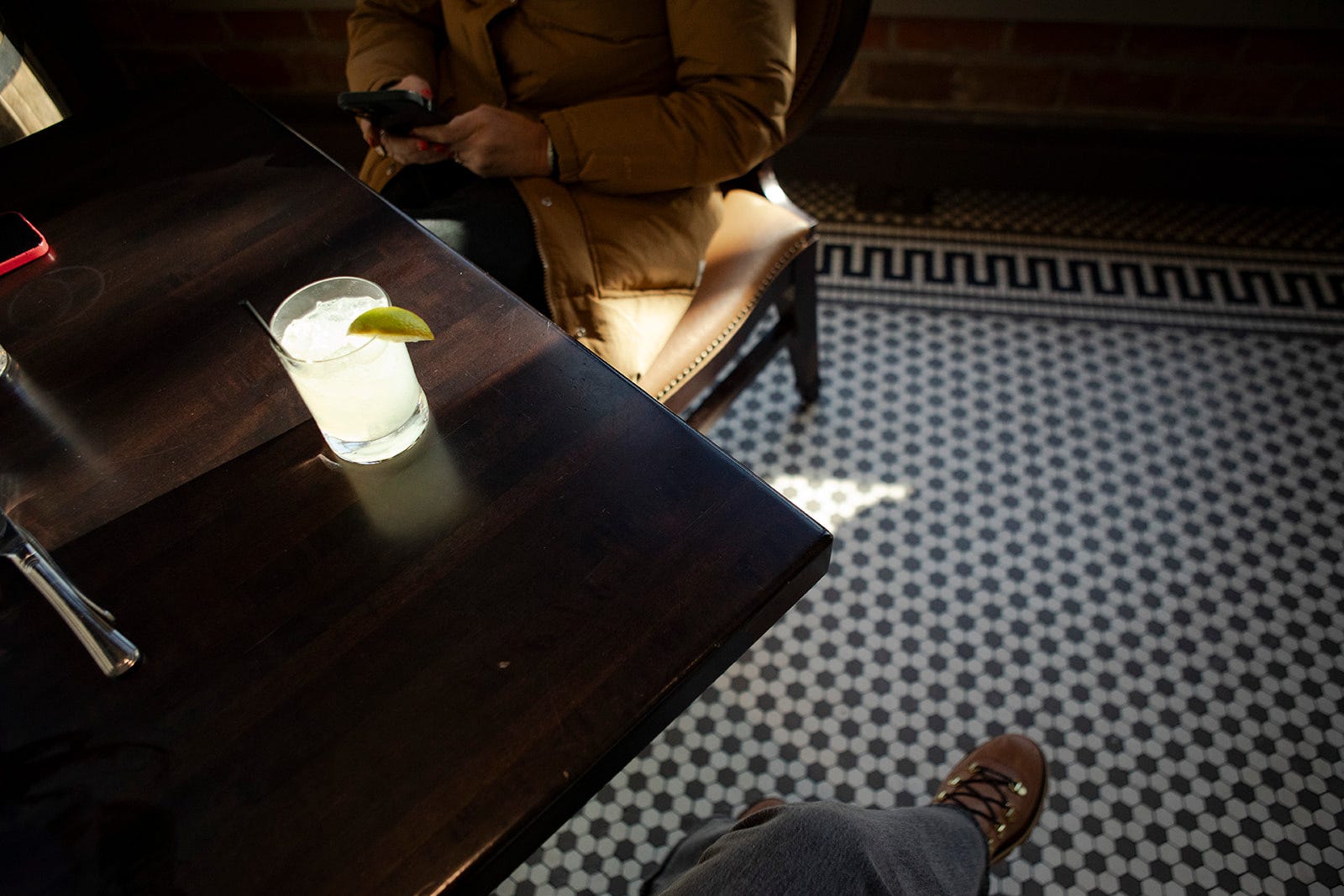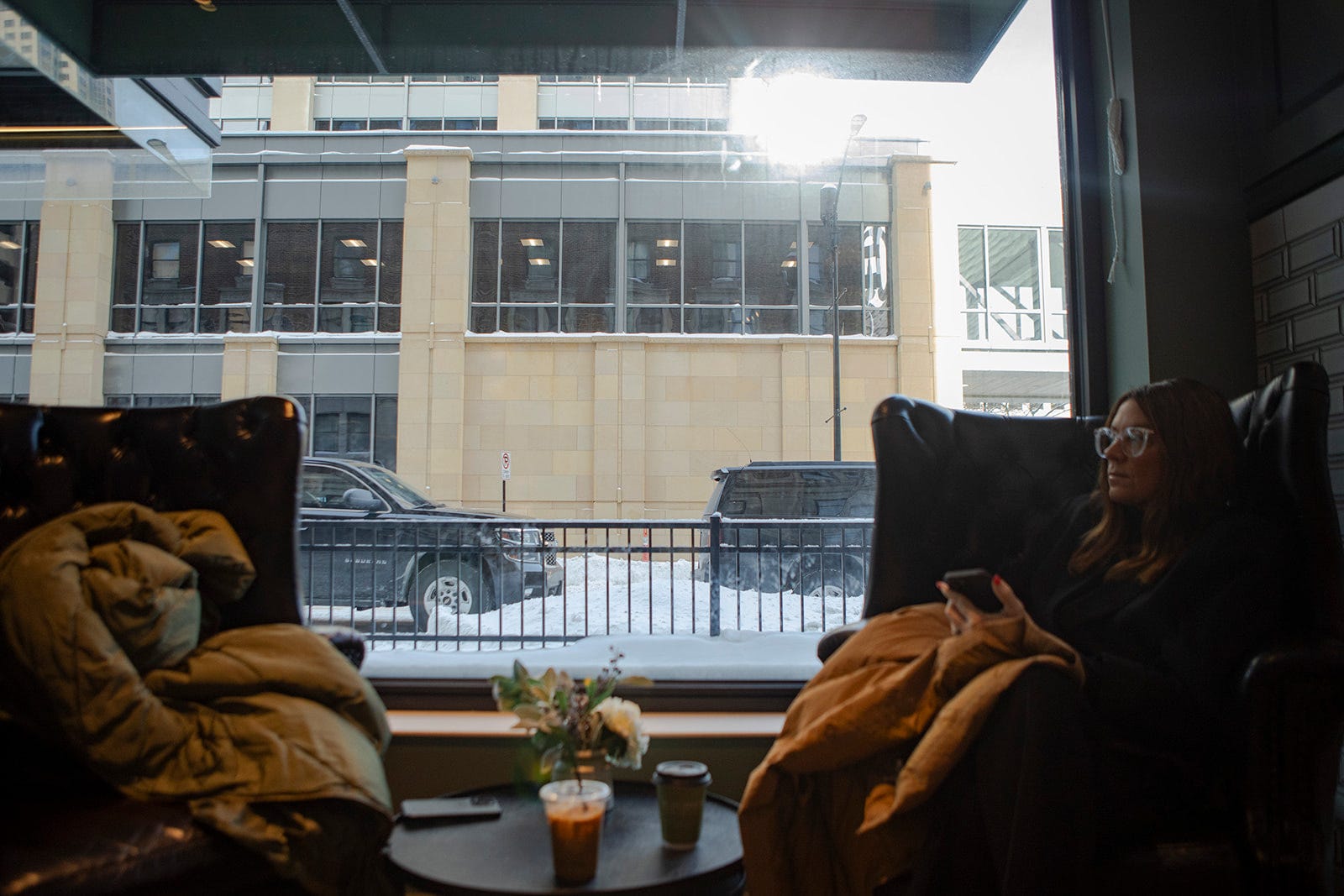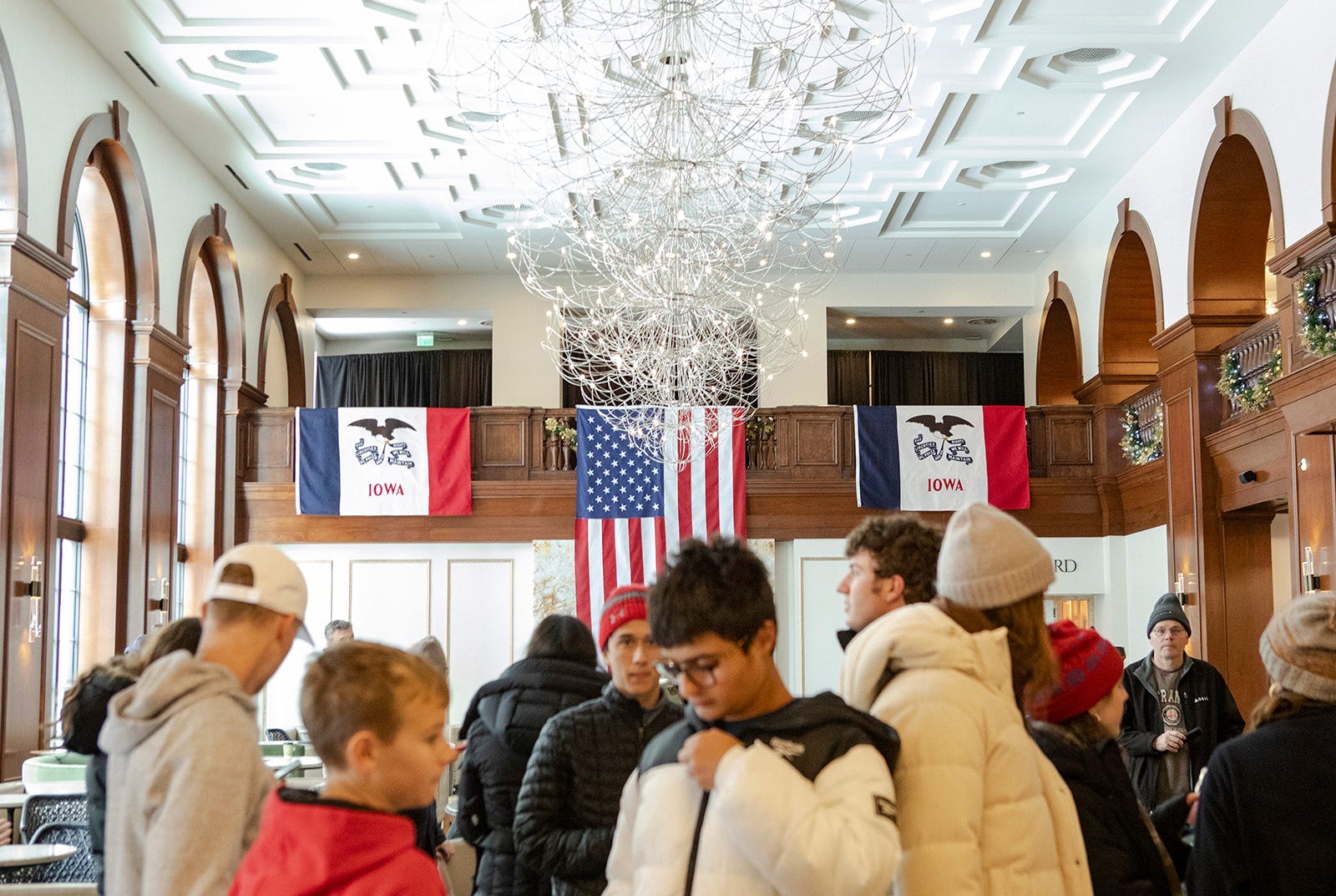Iowa Caucus Chronicles
Collected Notes During Three Days In Freezing Temps With The GOP
"You can't sit home. If you're sick as a dog, you say 'Darling, I gotta make it.' Even if you vote and then pass away, it's worth it." — Donald J. Trump
I was told the Iowa caucus was worth my efforts: “Lots of stories and good energy leading up to voting day” was the message. Getting there on incredibly short notice, however, was a different story. A series of snowstorms rolling through the Midwest made it especially hard to navigate.
But we made it. I felt the energy. And I came away with a few stories to share.
The GOP caucus was described to me as a series of small-town rallies in each precinct where representatives take the stage at various voting sites to drum up support and secure votes for competing candidates. This scene — people gathering in real time to sort through hand-counted results — is what sold me. In an age of suspected election fraud, it sounded like the most wholesome alternative to the madness we've come to expect.
Our first flight was canceled the day before, due to the latest Boeing recall issues. You know, loose bolts and doors flying open mid-flight, threatening to suck passengers right out of their seats at 35,000 feet — "mechanical issues" that were quietly addressed in private meetings at Capitol Hill last week.
Our second option was not ideal: Fly into Omaha and take a 2-hour train ride that would drop us off close enough to Des Moines. Everything I read online said that trains don't stop, even in blizzard conditions, so I embraced this as a rugged but intresting alternative. I didn't necessarily resent a snowy scenic route, either. Being a writer traveling by train makes me feel more like a poet than a pundit. Plus, I could work comfortably on the train on the way over. I was looking forward to it as a cinematic Plan B.
We booked a hotel close to Amtrak and arrived late at night after a rough flight. We were warned it might get "bumpy shortly after take off." The build-up to the anticipated turbulence was far more traumatic than the actual turbulence. After the warning was announced, a frazzled flight attendant came rushing through the aisles, handing out barf bags, preparing us for a brutal toss in the sky. Instantly, I lost my cool, falling into a vocal outburst of obscenities and prayer, looking around to decide what my last chance at religion might be.
"Since when does turbulence call for barf bags?!" I yelled, looking around for anyone to answer.
"IS ANYONE ELSE SCARED HERE, OR WHAT?!"
(Note: Denise and I don't like to fly. We travel constantly — now more than ever — but that doesn't mean we have learned to enjoy it. This particular journey did nothing to dispel us of this opinion.)
Desperate to ease my mounting anxiety, I started frantically digging through my bag and miraculously found a lone Valium at the bottom, downed with a tiny bottle of vodka.
Next to me, Denise started texting her kids emotional messages with heartfelt life advice as her last possible communication trace.
"Gurl, why are you flying in a snowstorm?" Lucy, her younger daughter, wrote back.
"Are you crying?" I asked. She was.
I figured if she was calm enough to draft deathbed sentiments to her children between tears and tequila, I should, too. In a group text, I told my family that we were headed into rough turbulence and that I loved them. I would call as soon as we landed safely to make sure they fed the bunnies and never caved to social pressures whenever integrity was at stake.
"Don't forget to brush your teeth!" I added (specifically for Hayes) instead of the sentimental Dylan quote I had in mind, which I knew they would likely ignore, only to feel guilty about later in life.
Arlo was the first to respond, telling me how much he loved me; typical first-born tendencies. The others quickly followed. Mike chimed in last. His reply (I read it twice) seemed possibly meant for someone else — certainly not his wife aboard a deathtrap. He answered back with day plans. They included swinging by his parent's house to pick up a flatbed trailer so he could haul a slew of olive trees from the nursery back to our house to fill sparse bits of landscape coloring our slope.
"Why is your dad telling me about landscape stuff when I'm on a very concerning flight?" I text Arlo before posting family responses online.
"OMG, this is an episode of Curb Your Enthusiasm!" my friend Jen DM'd me. In her message, she described the time Cheryl called Larry to tell him she loved him — fearing her plane was crashing — and he kept asking her about a lost remote. Ultimately, it's what ended them, Jen explained.
"I've never seen the show," I confessed, "but I'm pretty sure I'm living that episode."
Commute from Hell
In Omaha the negative temps sent a startling shock to our senses. Upon arrival, we dragged our luggage through piled-up pathways and two flights of stairs (as our driver sat watching us struggle, offering no help) and went straight to bed.
The following day, at 4:40 am on the dot, we headed down to the lobby to meet our driver, who arrived 15 minutes early to drop us off at the station, only to find its lobby locked and not a single soul in sight. The driver warned us that standing in negative degrees for too long was potentially deadly. His solution was to drive us around until the train was closer.
Except the train never arrived. Not 5, 8, or 20 minutes after it was supposed to.
Finally, I got out of the car and knocked on the window of a staffer parked in the lot, with a beanie pulled so far over his eyes I worried that I might be interacting with a Snowtown murderer in disguise stalking his prey, who informed me that the train had in fact been canceled.
Updates online were deceiving; they continued to assure us it was running "on time."
We returned to the hotel, frustrated and defeated. The receptionist, a portly woman with a serious chip on her shoulder, refused to let us back into our room. Her resistance was infuriating. I argued (first calmly, then not) that we had paid for the room and were entitled to it until checkout, still 6 hours away. This rationale failed. She said because she had already checked us out, assuming we were done with our stay, she could only reinstate our key once a manager arrived. She suggested we rent a car and drive ourselves to Des Moines. After all our pleading and complaints fell flat, and because the lobby was so cold and depressingly stark in decor — with only stiffly boiled eggs and stale coffee as snack options — I went back to her desk 45 minutes later to ask if I could just book another room so we could go back to sleep for a couple of hours until we could figure out our next move.
She pushed the rental car solution at me once again. "Check-in isn’t until 3 pm," she replied, eyes glued to the TV above her.
"This bitch is trying to kill us," I texted Denise from the front desk. "I swear she wants to see two California women on the news tonight being pulled from a snowy ditch thanks to a fateful collision with black ice on their way to the Iowa caucus."
Ride requests circled aimlessly for the next hour. Ubers were not willing to pick us up since every news station was warning locals to stay put, with each new update bringing word of more catastrophes, car wrecks, and fatalities.
Finally, a driver responded. Minutes later, he called from his personal line demanding an extra $100 because of such risky conditions. I agreed, only to have to cancel when he showed up in a minivan with bald tires.
"This might be another death trap," Denise said. "We're not getting in that."
The second driver was a saintly substitute. He showed up in a well-equipped car, quietly reassuring us the whole way up. By then, the snow had stopped, but the highways were still slick enough to keep me locked in anxiety the entire drive up, with good reason — I counted 7 cars overturned and abandoned in snowy ditches along the way.
The risk we take for Republicans. . .
Teens for Trump
Finally at our destination, we checked into Hotel Fort Des Moines, a historic haunt with an enormous American flag strung elegantly from the upper balcony in the front lobby — a patriotic statement that set the tone for the flush of people gathered at the entrance.
"What's everyone doing here?" I asked a clean-cut college kid in a MAGA hat, re: the colorful crowd milling around the stairwell that men in suits kept subtly herding further back.
"Trump's staying here," he told me. “We're all waiting for him to come down." He nodded to the window in the cafe, where a long line of black SUVs was idling in the snow, waiting for their king in red tie to make his departure.
Waiting for Trump is a game his supporters are always willing to play. They stand around without complaint, sometimes for hours, hoping to catch a glimpse of him. In every situation I've experienced where Trump is in close proximity, from the filthy streets of New York to the gold-plated halls of Mar-a-Lago, his fans and haters alike clamor at any opportunity to get close to him. By and large, divisive as he is, he holds the title for most magnetic persona in modern times.
I was introduced to a group of teenage journalism students in the crowd waiting for him. A couple of them were happy to show off selfies they'd taken with Trump the day before. Overhearing their enthusiasm, a mother leaned in to share a video of Trump stopping to greet her two children, complimenting her on her “good-looking family" before pulling both kids out of the roped area to snap a photo with him.
One of the teenage girls asked what I was doing in Iowa. I told her I was an independent writer covering the campaign trail on Substack.
"Oh, really!" her face lit up. "What would you say is the difference between working for a bigger outlet and working on your own?"
"I can’t say. I've never worked for anyone else. But I do think independent reporters are having a come-up. Having no boss means we can report things as true as we see them without outside caution or conflict interfering."
With that, we snapped a photo together and traded IG handles before parting ways. "Enjoy your stay!" she said on her way out the door to catch Nikki Haley's morning rally.
A Chance Encounter
At a French cafe down the street, Denise and I grabbed lunch, opting for a table in the back near the window so the sun could warm our backs. We ordered chicken dumplings, salad, and white wine. By midday, the restaurant was empty, save for a table of three seated next to us.
I didn't see him walk over; he appeared without warning. But when I glanced up, the look on his face told me everything about where this interaction was headed.
Denise, not recognizing him, cheerfully greeted Joe Hagen from Vanity Fair who had paused awkwardly in front of us, glaring down at me.
"You were at her Christmas party?" Denise asked, clueless to our connection.
"No, he wasn't," I answered, laughing uncomfortably.
Small talk briefly ensued around caucus details. Whatever was said escapes me now; it was all nonsense leading up to confrontation. I knew he was there to discuss the story I did on him as an unexpected prelude to the RFK Jr. series that clearly pissed him off. Of all the people in Iowa, of course I would run into Joe Hagen in an empty, random cafe.
He wanted to tell me, face to face, that what I did was "lame" — a "rookie move," he called it, to write about him without giving him any warning.
"I wasn't planning on writing a story about you," I told him. "You're just where the story unexpectedly started. Nothing was precalculated."
It was the truth. Initially, I was open to the idea of having him write an article about me even though I loathed his political pieces, specifically the one that shredded Kennedy.
What I picked up on during the afternoon we spent together was nothing close to what he pitched to me prior. Not at any point did I feel like he was interested in getting to know me. The nature of his questions seemed to align me with Q Anon fanatics, and to pin me as a calculated contrarian.
“You were not there to learn anything about him,” I added.
In general, I avoid confrontation at all costs. I hate conflict, especially encounters like these. But as he continued to insult and talk down to me, insinuating that I had not only betrayed traditional media etiquette but that I was some kind of amateur who'd scraped my way to the top, I felt a hot flash switch on inside me.
Would he be so inclined to confront me with such arrogance if I were a man?
"You write these kinds of pieces about people all the time," I said. He went in with an agenda on the RFK hit piece that I, as a reader with a similar outlook as Kennedy about Covid, admittedly resented. The angle reduced us to crazed, paranoid, misinformed idiots. And painted Kennedy as the rage filled lunatic amplifying our message.
Despite being a veteran journalist for a once-celebrated outlet, he was not clever enough to hide his bias. Vanity Fair, like so many others, writes the same article about Trump and Kennedy, over and over again with new names under editor bylines and new titles to introduce recycled slander.
"I look at you like you're in RFK's pocket," he said with a smug expression, pointing his finger at me.
"I am in no one's pocket. I pay for everything on every trip with own my dime, and that's because the only way people like me can learn about candidates like him, without your media slant attached, is to follow him around myself and relay what I uncover along the way."
By the end of the conversation, both of us were heated, arguing back and forth in hushed tones, while Denise sat silent until it came to an end.
"The last thing I'll say to you is that life is long," Joe said. "Just remember that."
Based on the intensity of his delivery, I knew it was a line he had rehearsed before approaching us.
Watching him walk away, it occurred to me how even this loaded farewell — a message meant to trigger a deeper reflection within me — reiterates how much our overall perspectives differ. Joe views life as long — anticipating our paths will likely cross later and that karma will eventually level me because of the reckless impulses I cave to. My outlook is the exact opposite: I see life as short and believe that every moment offers writers fleeting opportunity to honor their authentic self, and the truths they encounter, no matter what the consequence on the other side might be.
He prides himself on a veteran legacy in dying media. I pride myself on choosing stories intuitively and embracing unpredictable impact.
After he was gone, the man at the table next to us came over to ask if we needed another round. The waiter appeared, too.
“THAT was intense,” his wife said, admitting the interaction snagged their attention.
“He was watching you guys from the bar for awhile,” the waiter added. “It took him a couple drinks before he made his way over.”
“And, Vanity Fair footed that bill,” I muttered, signing the check on the table.









